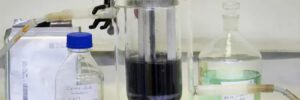
Researchers at Chalmers University of Technology in Sweden have developed a new approach to recycling metals from used EV batteries.
The method recovers 100% of the aluminum and 98% of the lithium from EV batteries, according to the researchers. In traditional aqueous-based recycling, all EV battery metals are dissolved in inorganic acid to remove impurities like aluminum and copper. Then, nickel, cobalt, manganese (NCM) and lithium are recovered. But in the new method, researchers extract lithium and aluminum first. This reduces the waste of NCM metals needed to build new EV batteries. The raw material is available as a finely ground black powder dissolved in transparent oxalic acid. Researchers created a novel formula employing oxalic acid, found in rhubarb and spinach, by fine-tuning temperature, concentration and time.
“We need alternatives to inorganic chemicals. One of the biggest bottlenecks in today’s processes is removing residual materials like aluminum. This is an innovative method that can offer the recycling industry new alternatives and help solve problems that hinder development,” says Martina Petranikova, Associate Professor at the Department of Chemistry and Chemical Engineering at Chalmers.
Source: Chalmers
from Charged EVs https://ift.tt/cd7hoV3


No comments:
Post a Comment